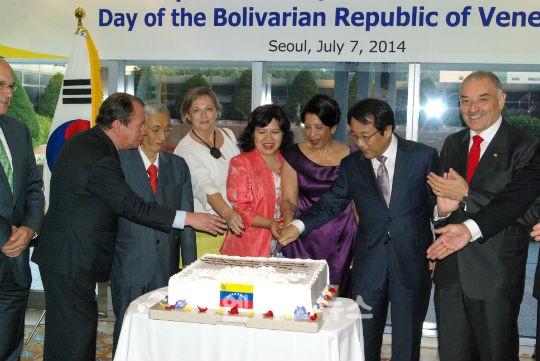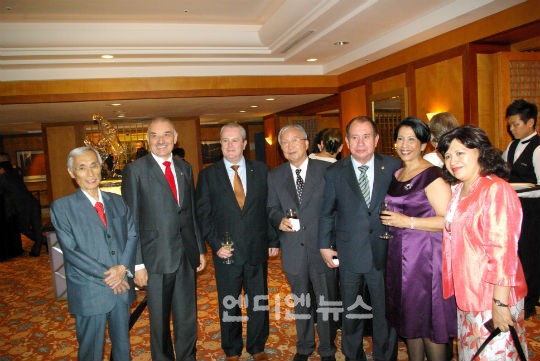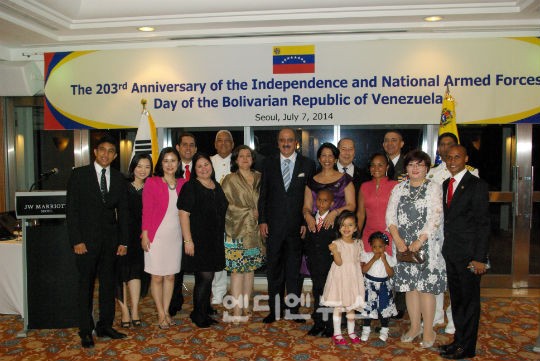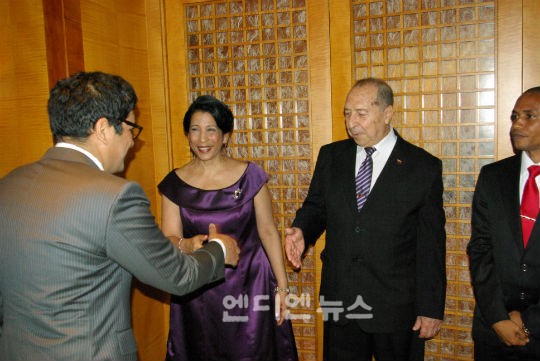"Current national plans in Venezuela which are under way, are the legacy of Hugo Chavez, our eternal commander", Charge d'Affaires a.i. Yadira Hidalgo de Ortiz
Expressing her sincere thanks for enthusiastic passion & affection toward Venezuela, Charge d'Affaires a.i. Yadira Hidalgo de Ortiz, Embassy of the Bolivarian Republic of Venezuela in Seoul elaborated on 5 key national plans of Venezuela in a reception to commemorate the 203th Anniversary of the Independence & National Armed Forces Day of the Bolivarian Republic of Venezuela.
 | ||
| ▲ From right, Amb. Ceferino Adrian Valdez Peralta of Paraguay, Director-General Jang, and CDA Yadira Hidalgo de Ortiz take part in a cake-cutting ceremony to mark 203th Anniversary of the Independence & National Armed Forces Day of the Bolivarian Republic of Venezuela with envoys from Latin American countries. | ||
Charge d'Affaires a.i. Yadira Hidalgo de Ortiz stressed that the Government of Venezuela attaches most priority on maximizing national welfare, pursuing the nation's happiness as the most preference. Looking back upon Hugo Chavez, former Venezuela President, she said that Hugo Chavez was a politician who devoted on the integration of Latin America & Caribbean countries. In this context, to cooperate & contribute for international geopolitical development as well, are one of the important 5 national plans for the Venezuela, Yadira Hidalgo de Ortiz explained.
As his return address, Director-General Jang Myung-soo, Latin America & Caribbean Affairs Bureau, MOFAT who was on hand to congratulate the 203th Anniversary of the Independence & National Armed Forces Day of the Bolivarian Republic of Venezuela, underscored: "Korea & Venezuela are feeling more closely not only through existing political & economic field, but also cultural skinship". Beyond last 50 years since both countries' diplomatic ties in 1965, forthcoming 50 years are expected to pave the way for the era the two countriea contribute to the happiness of global village, Jang said.
Amb. Grecia Fiordalicia Pichaardo Polanco of the Dominican Republic & president Cha-hoon Koo of KCLAC sent their congratulating wreaths to the venue of the reception, Classic 7, the J.W. Marriot Seoul.
 | ||
| ▲ From right, Amb. Guadalupe Palomegue de Taboada of Bolivia, CDA Yadira Hidalgo de Ortiz & Costa Rica Amb. Manuel Lopez Trigo pose with other envoys from Latin American region who included Ambs. from left, Edmundo Sussumu Fujita of Brazil, Ceferino Adrian Valdez Peralta of Paraguay & Guatemala Amb. Gustavo Adolfo Lopez Calderon. | ||
Petroleum Sector : The petroleum industry on an international scale has a market competitiveness, which is constantly improving, pressed by opportunities in traditional and new areas, in which technology stimulates development and competitiveness that were previously unavailable to the market because of high costs and difficulty of operation.
In Venezuela, sustained petroleum strategies have been carried out in the petroleum sector, based on a policy of production in tune with the petroleum market, with adherence to OPEC agreements.
Gas Sector: The government expects to increase production of crude to 5 million barrels per day (bpd) by 2010. To achieve this goal, the state-owned company Petróleos de Venezuela (Pdvsa) has an investment plan that calls for US$ 31.25 billion from the company’s own coffers and US$ 12.53 billion in private capital.
The gas producing potential will help boost the national economy by meeting the requirements of the oil, electric and petrochemical sectors, among others, as well as the growing needs on the international market. It will also help with the hydrocarbon deficit on the domestic market, fostering development of extra heavy crudes in the Orinoco Belt, the petrochemical industry and, lastly, for export.
Petrochemical Sector: Petrochemical development in Venezuela offers great potential to investors. Among the competitive advantages that Venezuela offers in this area, it's worth mentioning the availability of raw materials, their geographical location and the easy access to high growth markets such as Latina America. The advantages can sustain the diversification of our exports and reactivate the national economy in this sector.
To benefit from the potential that exist in this area, a plan has been conceived for the chemical sector, based on the competitive development of the methane and ethane petrochemical sectors, where Pequiven plays a fundamental role in the industrialization of refineries in order to get a greater value added from normally imported specialized products, the manufacture of industrial chemicals and the promotion of the secondary petrochemical industries and the consuming industries.
 | ||
| ▲ Group photo session including embassy staffs | ||
Tourism Sector: Venezuela has a variety of climate and scenery, which provide it with a unique potential as a tourism destination. Nevertheless, this sector has not been adequately exploited, so it can definitely be converted into an attractive source of investment. The Venezuelan State is aware of this reality, and that is why it has approved a series of laws aimed at promoting its development. At present there are several projects for building hotels and tourism complexes in preferential areas to develop adventure, mountain, ecology and beach tourism activities.
Trade Sector: The objective of trade policy in Venezuela is to facilitate and consolidate the change towards competitive commercialization in order to satisfy consumption of goods and services through the promotion of competitiveness and exports, with the aim of placing our goods and services on international markets.
Industrial Sector: The main objective of the strategy for industrial development is founded in the reindustrialization of the country, in conditions of greater equality and competitiveness.
Agricultural Sector: Agriculture plays a fundamental role in the new economic model being implemented in the country. The national food system and production of fibbers as an industrial raw material are of pivotal importance. The important water and biological resources available make possible an agricultural sector on a much larger scale than the current one, and with a competitive potential in tune with the new international realities of new technologies and of the geographic location of the country.
 | ||
| ▲ CDA Yadira Hidalgo de Ortiz & Mr. William Ortiz, husband of Mrs. Yadira Hidalgo de Ortiz welcoming Pakistan deputy head of mission & first secretary Mr. Shahbaz M. Malik | ||
Technological upgrade to increase competitiveness.
Maintaining industrial activity and the source of employment.
Open opportunities for economic expansion and further employment.
Telecommunications Sector: One of the non-petroleum sectors that have had the greatest growth on the economy in the last few years has been telecommunications. It has accumulated an investment of over $ 16 billion over the last 5 years, and with the development of new technologies and the granting of new concessions, the telecommunications sector can be expected to receive further investment of $8-10 billion over the next ten years.
The increase in investment is a consequence, among other factors, of the privileged geographical position of Venezuela, which allows the access to new technologies, training programs and technical support. The extent of the technological infrastructure recently installed in the country opens the possibility for Venezuela to become a telecommunications hub for the Caribbean and Latin American regions.

